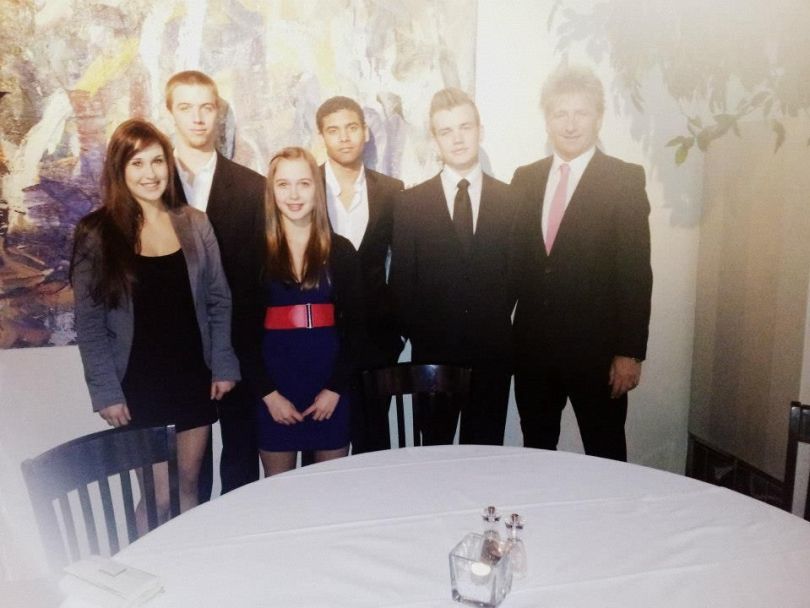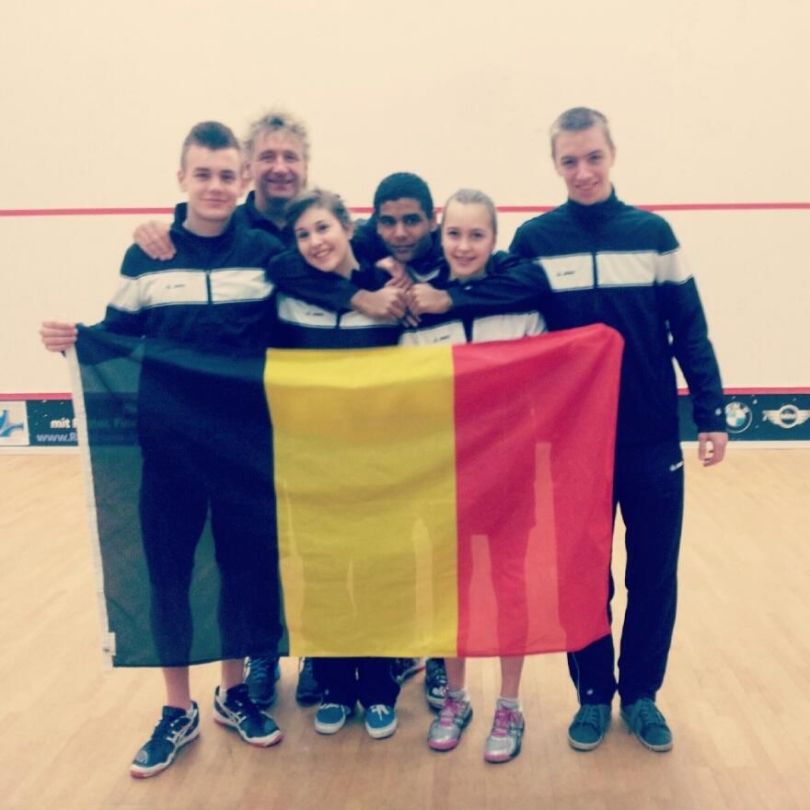A Rising Star in Squash Coaching: The Journey of Tiago
In the squash world, where legendary players often dominate the headlines, the stories of those working tirelessly behind the scenes sometimes go unnoticed.
Tiago Goriely is one of those young coaches whose name you hear in the squash wings but totally unknown from the general public.
Although he is pausing his coaching career at the moment to try and improve his computer science skills in view to change the face of squash coaching in the long run, names like Satomi Watanabe, Rana Ismail, Gina Kennedy, Grace Gear, Jasmine Hutton, and also British Junior U19 Nationals Runner up Alex Broadbridge come up for the players he trains with – without claiming to be the only source of their apprenticeship.
Cultural Perspective: Bridging Two Worlds
First time I noticed Tiago was in Nantes 2022, their last edition – the Gangs of Squash. He was coaching Tinne Gilis – against Satomi that he started coaching a year later, and also Auguste Dussourd.
I noticed him for several reasons: one, he is of African origins, and there are not that many, unfortunately, on the Squash Scene. Two, coaching Tinne meant that he knew what he was doing – the SquashTV commentators were wondering who the heck was that young boy they didn’t know. I remembered his face from Junior Squash, and it was a case of “What even happened to him” for me.
“I’m mixed race; I come from European and African backgrounds,” Tiago shares. “I was raised by an African mum and a European dad, giving me a different perspective. This background helps me coach people from various backgrounds because I understand them. Sometimes I feel like I understand them pretty easily because I know what it is to have different cultures, where right and wrong isn’t always the same for everyone.”
This cultural awareness is a cornerstone of his coaching philosophy, allowing him to adapt his methods to resonate with players from diverse walks of life.
Early Beginnings in Brussels
Growing up in Brussels, Belgium, Tiago lived a life immersed in sports. “I started squash because my dad, a former top-ten badminton player in Belgium, switched to squash,” he explains. “I was always around the squash club with him, so I just picked up a racket and fell in love with the sport.”
While he initially split his time between tennis and squash, squash soon became his primary focus. His dedication paid off, as he represented Belgium on the national team alongside the renowned Gilis sisters and won national titles across all junior categories. Unfortunately, his promising playing career was cut short by two hip surgeries, but his passion for the sport persisted.
A Foray into Coaching
Coaching came naturally to Tiago. “I started coaching tennis when I was 15 for Watermael Boitsfort within the Justine Hénin Academy in Brussels.”
He was not exactly old enough to be allowed to coach then, but his enthusiasm and ability to interact with the youngsters made him a familiar feature in the camps.
“At the same time, I began working with junior squash players at my club,” he recalls. While these roles initially served as a way to earn money, they laid the foundation for his future career.
He later worked with the Belgian Squash Federation, serving briefly as the Vice President of the LFS league.
“I needed more freedom,” he admits. “Living in London made it hard to stay involved with the federation, but those experiences taught me a lot.”
He even organised PSA tournaments, including plans for a significant event in Brussels that COVID-19 unfortunately disrupted.
Learning from Alain Crabbé and other coaches
Reflecting on his own development, Tiago credits Winner’s Club in Brussels coach Alain Crabbé, for shaping his approach.
“Without Alain, I’d be nothing,” he says. “He was coaching at a club with nine courts, juggling four kids, and still found time for me. He is family. He was coaching me for free, and I was repaying him once in a while with my prize money.”
Alain holds Tiago in high esteem and only has praise for him:
“Tiago is one of the first juniors I coached at a high level. He was 6 years old at the time, and over time, we became friends, not just coach and student! He’s someone I deeply appreciate because he never forgot that it all started with me and at his club, the Winners!
“He’s a respectful person with incredible talent, but injuries prevented him from keeping up with his friends, Auguste and Masotti. Whenever he comes back to the club, he’s always very humble and offers great advice to Chloé and Alyssia, my two daughters. When he’s there, he even takes them through exercises!
“We talk often because, more than a player, he’s my friend. We experienced all the junior tournaments together, from when he was 10 until he was 19, starting with tournaments in Belgium from the age of 8, those experiences create strong bonds. He’s part of our family…
“He’s also always in a good mood. We’ve only ever argued once in all these years – and knowing my personality, that’s really unusual!”
Tiago adds:
“Resources were scarce at the time, I wanted to get better, but it was not that simple. I often had to travel to the Netherlands or the UK to find better opportunities, and I am very grateful to Ben Ford, I might not be where I am today without him. He was one of the coaches who accepted me into his pro squads in England and also opened my mind to the complexity of the game. Also, Robbie Temple, later on, also welcomed me and taught me a lot.
“These two coaches allowed me to train regularly for the first time with pros like Tom Richards, Charles Sharpe, Lyell Fuller, Alison Waters, Robert Downer, and others.
“I benefited from the knowledge of Jason Morris (I trained with him 5 months in Amsterdam in Tommy Berden’s club). And how not to mention Ronny Vlassaks, who helped the Gilis Sisters immensely and myself, our Belgium National Coach at the time.
“They might not realise it, but I am extremely grateful. Even though it might not have seemed like a big deal to them, it changed the course of my squash career.
This struggle inspired his current coaching philosophy. “I try to provide the environment my players need to thrive, whether professionals or amateurs. It’s not just about what happens on the court. I focus on mental health, match analysis, and individualised strategies. It’s all about building trust and respect.”
Tailored Training Methods
Tiago prides himself on adapting to each player’s unique needs. “Every player is different,” he notes. “I never coach the same way twice. It’s about listening, understanding what they need, and helping them achieve their goals.”
One notable example is his work with Auguste Dussourd. “Auguste and I started as rivals in junior tournaments, but we developed a friendship. Now, I help him with match analysis and strategy. Our trust in each other makes the partnership work.
“Also, we work together on an online coaching setup I put in place recently”.
Another success story is his collaboration with Satomi Watanabe. “Our partnership started by chance!
“I needed her to pass an item to Tinne, so I proposed meeting her at the club. I offered to feed her balls as she was working on her own. That casual session turned into six training days, and soon after, we began working together full-time.”
“She’s incredibly driven, and seeing her progress has been a joy.”
Balancing Coaching and Academics
Currently pursuing a master’s in computer science, Tiago is exploring ways to combine technology with squash. “This year has been intense, so I’ve limited my coaching to a few players. But I’m excited about using tech to innovate in the sport.”
As he doesn’t have as much time as he used to coach his players, he expanded his reach through online coaching with the help of Auguste.
“I provide personalised weekly programs for players, whether they’re training locally or abroad. It includes everything from solo drills to match preparation,” he explains. “The goal is to give them structure and support so they can focus on improving their game.”
This approach has received positive feedback, with players appreciating the flexibility and comprehensive nature of his programs.
“Let’s take what we do with Alex Broadbridge, England U19. He recently played the British nationals and he’s following my programme.
“We had the UK Nationals tournament as a main goal and so we built a programme specifically for it. . A week before the tournament, we had sessions to make sure that he’s match-ready, and also provided him support to analyse his opponent in the semifinal
“So he was prepared for the tournament and he knew that he was working on specific stuff on a day-to-day basis basis to performed properly during that tournament. And he worked out pretty well because he went to the final…
“His coaching has been done fully remotely, and yet allowed him to work with his own coach, Tim Vail in person . We are able to provide support around that coaching and add more things to achieve better performance and more growth, I guess.
Looking Ahead
As he juggles his studies and coaching, Tiago remains committed to helping players at all levels. “I believe in building relationships and sharing the love of the sport,” he says. “Whether it’s a beginner learning to hold a racket or a pro aiming for the top, my goal is to help them enjoy the journey and reach their potential.”
With his unique background, innovative methods, and unwavering dedication, this young Belgian coach is undoubtedly a rising star in the squash world. His journey is a testament to the power of passion but also a tribute to his discretion and lack of self-promotion.
His adaptability and resilience make of him a great coach: life threw him a few lemons with his early injuries and he made a lovely lemonade for sure…










